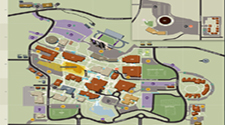Math Matters and Myths!
For many reasons, a student may enter college without the foundational math skills necessary to succeed in college-level mathematics. This is not unique to any one university or state, or even country. Developmental Math Courses are taught at 99% of two-year colleges & 75% of four-year public universities, so the need is great. If you need developmental math, you are not alone.
"Developmental education helps underprepared students prepare, prepared students advance, and advanced students excel."
- National Association of Developmental Education
Also, while the perception is that developmental education is remedial course work, it really is much more than that. Developmental education takes a holistic approach to educating a student. Teachers seek to not only remediate knowledge but also to build learning and success skills that will serve students throughout all of their academic pursuits. Development education provides an opportunity for greater numbers of students to gain an education and is crucial for creating a well-educated workforce.
Math really matters!
Don't believe us? Consider the following:
♦ Have you ever tried to determine what grade you would need to get on a final exam to get the grade you wanted in the class? You were using Algebra.
♦ Do you have an idea for your own business? Algebra can help you determine if you can make a profit.
♦ What about trying to decide which cell phone plan is best for you? Yep. Algebra.
♦ And video games. We wouldn’t have a single video game without algebra. (Your HDTV relies on mathematics, too.)
♦ You use math each time you compare prices at the grocery store or figure out how much 20% off is going to save you.
♦ If you like to build things, the Pythagorean Theorem can help you make sure your corners are perfectly square.
♦ Math is also used in figuring your grade point average, sailing, landscaping, architecture, and medication doses.
♦ It's used in snowboarding, acoustics, outdoors product design, stained-glass windows, audiology, parking lot design, and weather forecasting...
As you can see, the list is practically endless. Math is everywhere!
Don’t be fooled by the myths that are out there!
MYTH: Some people are born “good” at math.
TRUTH: Many people believe math is innate. They believe you are either “born a math person” or “not born a math person”. However, success and ability in math is malleable, not fixed. Every student can be good at math with practice in a supportive learning environment.
MYTH: You don’t need to learn math to be successful—unless you are going to be an aerospace engineer.
TRUTH: Everyone needs math and uses math. Math helps you to navigate through everyday life successfully. Each of us would be hard-pressed to think of a day that we didn’t use math. Some examples of everyday math are: going shopping, cooking, driving, telling time, estimating, etc.
MYTH: Drill and repetition make you better at math.
TRUTH: New learning does not occur as a result of repetition and drilling (flashcards, worksheets, etc). These methods of drilling often result in negative math attitudes and disengagement with the subject. These methods encourage memorization, which is not indicative of skill/conceptual knowledge (see #5).
MYTH: There is a “Magic Key” for doing math.
TRUTH: There is no formula, rule, or general guideline which will suddenly unlock the mysteries of math. If there is a key to doing math, it is working hard, persisting through difficulty, overcoming anxiety about math, and using the same skills you use to be successful in everything else.
MYTH: There is only one way to solve a problem.
TRUTH: A math problem may be solved by a variety of methods which express individuality and originality-but there is no best way. New and interesting techniques for doing all levels of mathematics, from arithmetic to calculus, have been discovered by individuals from a variety of backgrounds. The way math is done is very individual and personal and the best method is the one which you feel most comfortable.
MYTH: Math is about memorization and speed.
TRUTH: Many students have a false belief that being fast and first is how you prove that you are smart in math. Success in math comes from understanding concepts, not memorization. When students learn math primarily through memorization, they miss out on developing critical thinking skills that are vital to being successful in math later on. Furthermore, speed is not a measure of ability. It is the result of experience and practice.
MYTH: Mathematicians do problems quickly and never make mistakes.
TRUTH: Solving new problems or learning new material is always difficult and time-consuming. The only problems mathematicians do quickly are ones that have been solved before. What distinguishes a mathematician is their ability to identify patterns, willingness to try new ideas, and their desire to persevere through “failures” that will invariably occur along the way.


